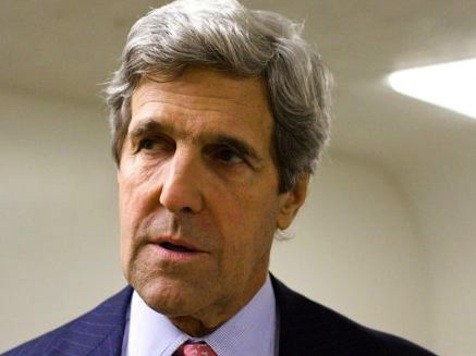By DONNA CASSATA
Associated Press
WASHINGTON
The chairman of the Senate Foreign Relations Committee _ and possibly the next secretary of state _ says mistakes were made at the State Department in the deadly Sept. 11 assault in Libya, but Congress shares some of the blame.
Sen. John Kerry spoke at the start of Thursday’s hearings. He says an independent probe pulls no punches about the lack of security at the U.S. diplomatic mission in Benghazi.
But Kerry also faults lawmakers for failing to provide sufficient funds to the State Department.
Secretary of State Hillary Rodham Clinton’s top deputies, William Burns and Thomas Nides, are testifying before Senate and House panels.
U.S. Ambassador Chris Stevens and three other Americans died in the attack.
THIS IS A BREAKING NEWS UPDATE. Check back soon for further information. AP’s earlier story is below.
Lawmakers want to know why security was “grossly inadequate” at the U.S. diplomatic mission in Libya when militants stormed the facility on Sept. 11, killing the ambassador and three other Americans, and why the military failed to respond faster during the nine-hour assault.
Members of the Senate and House foreign affairs committees on Thursday were to question Deputy Secretary of State William Burns, who is in charge of policy, and Deputy Secretary of State Thomas Nides, who is in charge of management, at back-to-back congressional hearings.
Their public testimony comes two days after an independent review panel issued a blistering report blaming management failures at the State Department for the lack of security at the Benghazi compound. It also comes as fallout from the report forced four State Department officials to step down Wednesday.
U.S. Ambassador Chris Stevens was killed in the attack along with information specialist Sean Smith and former Navy SEALs Glen Doherty and Tyrone Woods, who were contractors working for the CIA. Stevens was the first U.S. ambassador killed in the line of duty since 1979.
An unclassified version of the report by the Accountability Review Board concluded, “Systematic failures and leadership and management deficiencies at senior levels within two bureaus of the State Department resulted in a Special Mission security posture that was inadequate for Benghazi and grossly inadequate to deal with the attack that took place.”
The report singled out the Bureau of Diplomatic Security and the Bureau of Near East Affairs for criticism, saying there appeared to be a lack of cooperation and confusion over protection at the mission in Benghazi, a city in eastern Libya that was relatively lawless after the revolution that toppled Libyan strongman Moammar Gadhafi.
Obama administration officials said those who resigned were Eric Boswell, assistant secretary of state for diplomatic security; Charlene Lamb, deputy assistant secretary responsible for embassy security; and Raymond Maxwell, deputy assistant secretary of state who oversees the Maghreb nations of Libya, Algeria, Tunisia and Morocco. The officials spoke on condition of anonymity because they weren’t authorized to discuss personnel matters publicly.
Some of the three may have the option of being reassigned to other duties, the officials said.
State Department spokeswoman Victoria Nuland said the department had accepted the resignations of four people: Boswell and three others she declined to identify.
The resignations did little to mollify lawmakers who will question Burns and Nides and who insist that Secretary of State Hillary Rodham Clinton testify in the coming weeks despite her plan to leave the administration.
Clinton had been scheduled to testify before the committees, but canceled after fainting and sustaining a concussion last week while recovering from a stomach virus. Clinton is under doctors’ orders to rest.
The report’s findings underscore a fundamental problem the State Department has been trying to address for decades without success: how to protect diplomats while allowing them to perform their duties to reach out to foreign governments and the public to promote U.S. interests and values.
In a letter to Congress, Clinton said “our diplomats cannot work in bunkers and do their jobs.”
The American Foreign Service Association, the union that represents U.S. diplomats, said it agreed. It welcomed the findings and accepted the board’s 29 recommendations for improving embassy security, particularly at high-threat posts.
At the State Department, retired Adm. Mike Mullen, co-chairman of the review board, said the mission’s security fell through bureaucratic cracks caused in part because buildings were categorized as temporary. Budget constraints also led some officials to be more concerned with saving scarce money than in security, the report said.
The other co-chairman, retired ambassador Thomas Pickering, said personnel on the ground in Benghazi had reacted to the attack with bravery and professionalism. But he said the security precautions were “grossly inadequate” and the contingent was overwhelmed by the heavily armed militants.
Pickering and Mullen spoke shortly after briefing members of Congress in private.
___
Associated Press writer Matthew Lee contributed to this report.

COMMENTS
Please let us know if you're having issues with commenting.